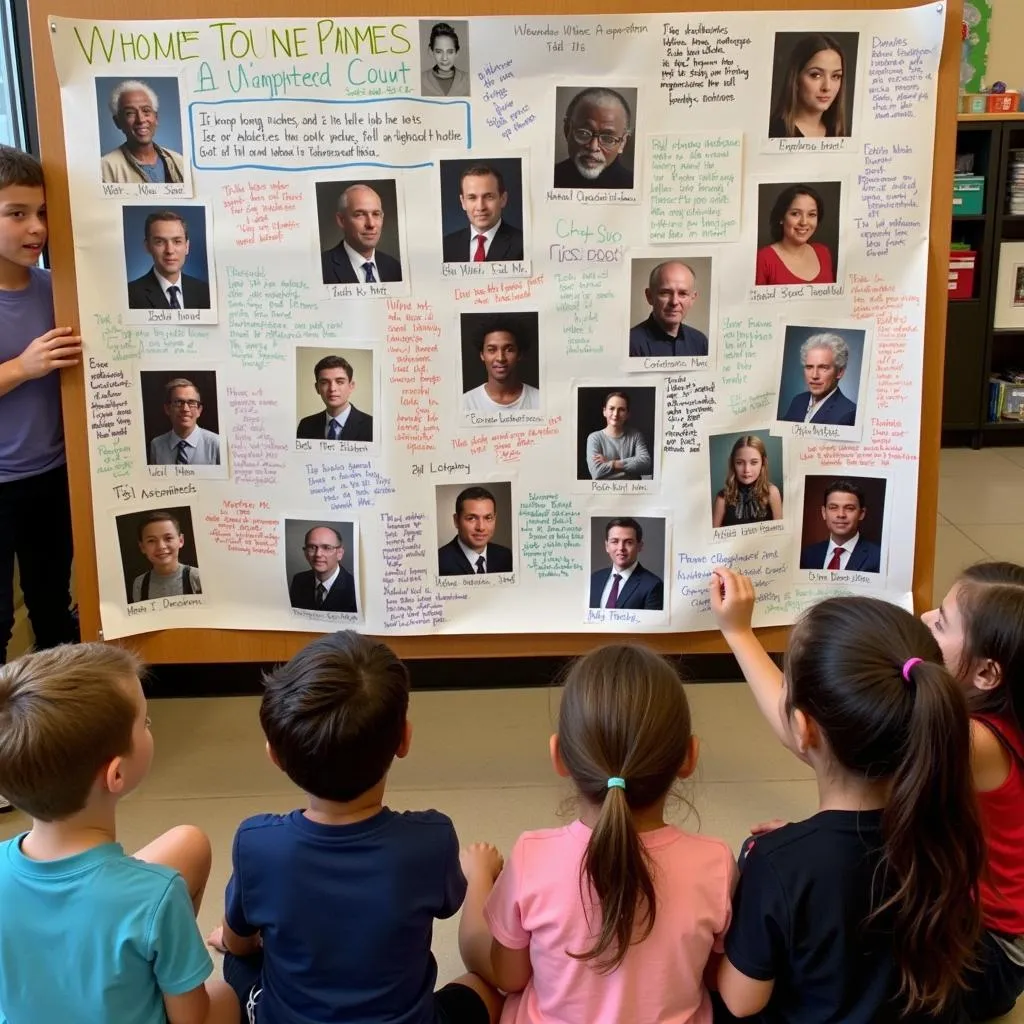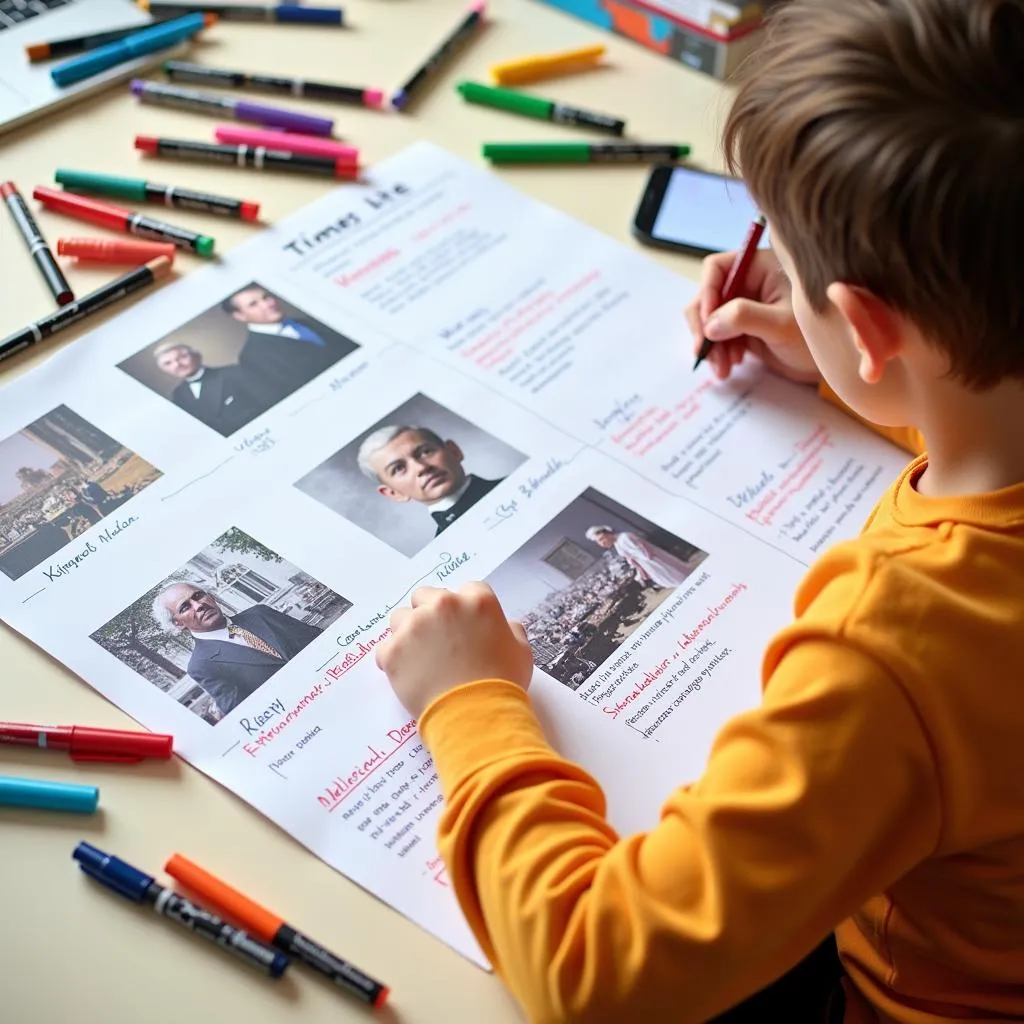Delving into biography research opens a window into the past, allowing kids to connect with fascinating individuals who shaped our world. Whether it’s a celebrated scientist, a courageous leader, or a groundbreaking artist, uncovering the stories of real people brings history to life in a captivating way.
Why is Biography Research Important for Kids?
Biography research isn’t just about memorizing dates and names; it’s about understanding the human experience across time.
- Building Empathy and Understanding: Stepping into the shoes of someone from a different era helps kids develop empathy and appreciate diverse perspectives.
- Inspiration and Role Models: Learning about the challenges and triumphs of others can inspire kids to pursue their dreams and make a difference.
- Developing Research Skills: Biography research encourages critical thinking, source analysis, and information synthesis – valuable skills for academic success.
Getting Started with Biography Research for Kids
Choosing a Subject: Who Captures Your Imagination?
The first step is picking someone who sparks your interest. Is it an astronaut who explored the stars? A writer who crafted beloved stories? Let curiosity be your guide!
 Kids brainstorming historical figures
Kids brainstorming historical figures
Gathering the Clues: Where to Find Reliable Information
- Books: Libraries and bookstores offer a treasure trove of biographies written specifically for young readers.
- Online Databases: Reputable websites like Britannica School and National Geographic Kids provide age-appropriate articles and multimedia resources.
- Museums and Historical Sites: Visiting places connected to your subject can offer firsthand insights and bring their story to life.
Piecing Together the Puzzle: Organizing Your Research
Once you’ve gathered information, it’s time to organize it into a cohesive narrative.
- Create a Timeline: A visual timeline helps map out key events in your subject’s life.
- Identify Key Accomplishments: What are the most notable things this person achieved?
- Explore Challenges and Obstacles: Every life has its ups and downs. What obstacles did your subject face, and how did they overcome them?
 Child creating a timeline for a biography project
Child creating a timeline for a biography project
Bringing the Story to Life: Creative Ways to Share Your Research
- Write a Biography: Become a storyteller! Weave together the facts you’ve gathered into an engaging narrative.
- Create a Presentation: Share your findings with classmates through a visually appealing presentation using slides, images, and even video clips.
- Build a Diorama or Model: Bring your subject’s world to life by constructing a diorama depicting a significant event or place from their life.
Expert Insights: Advice from a Seasoned Historian
“Remember,” advises Dr. Emily Carter, a history professor specializing in biography, “research is like detective work. You’re searching for clues to understand a person’s motivations, experiences, and impact on the world. Don’t be afraid to dig deep and ask questions!”
Biography Research: A Journey of Discovery
Biography research is an adventure that allows kids to connect with the past, uncover inspiring stories, and develop valuable research skills. So, choose a subject who ignites your curiosity, and embark on a journey of historical exploration!
FAQs about Biography Research for Kids
1. What if I can’t find much information about my chosen person?
Don’t get discouraged! Sometimes less well-known figures can be even more interesting to research. Talk to a librarian or your teacher for help finding additional resources.
2. How can I make sure the information I find is accurate?
It’s important to use reliable sources like books, academic websites, and museum resources. Check multiple sources to see if the information aligns.
3. Can I include my own opinions in my biography research project?
While it’s important to stick to the facts, you can share your thoughts and reflections on the person’s life and accomplishments. Just be sure to clearly separate facts from your own interpretations.
4. What are some good biography topics for elementary school students?
Consider figures like inventors (Alexander Graham Bell), activists (Martin Luther King Jr.), or artists (Frida Kahlo) who have made significant contributions that are easy for younger children to grasp.
5. How long should my biography research project be?
The length depends on your teacher’s guidelines and the age group. A good rule of thumb is to focus on quality over quantity, ensuring you cover the key aspects of the person’s life in a clear and engaging way.
Need Help with Your Historical Investigation?
Our team of passionate researchers is here to guide you! Contact us at 0904826292, email us at research@gmail.com, or visit us at No. 31, Alley 142/7, P. Phú Viên, Bồ Đề, Long Biên, Hà Nội, Việt Nam. Our dedicated customer support team is available 24/7 to assist with all your biography research needs.